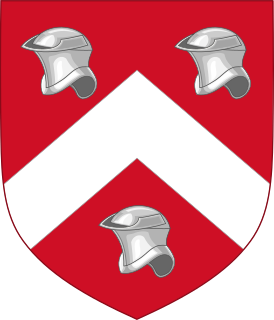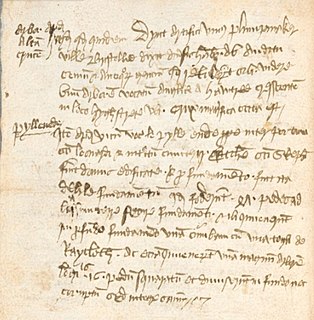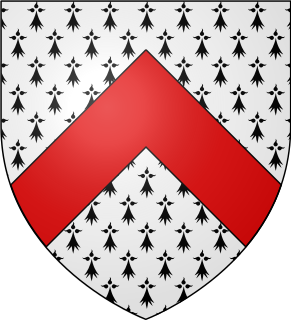
Sir Owen Tudor was a Welsh courtier and the second husband of Catherine of Valois (1401–1437), widow of King Henry V of England. He was the grandfather of Henry VII, founder of the Tudor dynasty. Owen was a descendant of a prominent family from Penmynydd on the Isle of Anglesey, which traces its lineage back to Ednyfed Fychan, a Welsh official and seneschal to the Kingdom of Gwynedd. Tudor's grandfather, Tudur ap Goronwy, married Margaret, daughter of Thomas ap Llywelyn ab Owain of Cardiganshire, the last male of the princely house of Deheubarth. Margaret's elder sister married Gruffudd Fychan of Glyndyfrdwy, whose son was Owain Glyndŵr. Owen's father, Maredudd ap Tudur, and his uncles were prominent in Owain Glyndŵr's revolt against English rule, the Glyndŵr Rising.

Sir John Fortescue of Ebrington in Gloucestershire, was Chief Justice of the King's Bench and was the author of De Laudibus Legum Angliae, first published posthumously circa 1543, an influential treatise on English law. In the course of Henry VI's reign, Fortescue was appointed one of the governors of Lincoln's Inn three times and served as a Member of Parliament from 1421 to 1437. He became one of the King's Serjeants during the Easter term of 1441, and subsequently served as Chief Justice of the King's Bench from 25 January 1442 to Easter term 1460.

Richard of Conisburgh, 3rd Earl of Cambridge was the second son of Edmund of Langley, 1st Duke of York, and Isabella of Castile, Duchess of York. He was beheaded for his part in the Southampton Plot, a conspiracy against King Henry V. He was the father of Richard Plantagenet, 3rd Duke of York, and the grandfather of King Edward IV and King Richard III.

William Hastings, 1st Baron Hastings KG was an English nobleman. A loyal follower of the House of York during the Wars of the Roses, he became a close friend and one of the most important courtiers of King Edward IV, whom he served as Lord Chamberlain. At the time of Edward's death he was one of the most powerful and richest men in England. He was executed following accusations of treason by Edward's brother and ultimate successor, Richard III. The date of his death is disputed; early histories give 13 June, which is the traditional date.
The Paston Letters are a collection of correspondence between members of the Paston family of Norfolk gentry and others connected with them in England between the years 1422 and 1509. The collection also includes state papers and other important documents.

William Worcester, also called William of Worcester or William Botoner was an English topographer, antiquary and chronicler.

The Barons of the Exchequer, or barones scaccarii, were the judges of the English court known as the Exchequer of Pleas. The Barons consisted of a Chief Baron of the Exchequer and several puisne (inferior) barons. When Robert Shute was appointed second baron in June 1579 the patent declared "he shall be reputed and be of the same order, rank, estimation, dignity and pre-eminence to all intents and purposes as any puisne judge of either of the two other courts." The rise of commercial trade in Elizabethan England occasioned fraudulent application of the Quo minus writ. More taxation demanded staff at the exchequer to sift an increase in the case load causing more widespread litigation cases to come to the court. From the 1580s onwards the Barons of Exchequer were no longer held in such low regard, and more likely to be Serjeants-at-law before qualification. The Inns of Courts began to exclude solicitors, and held posts for judges and barons open equally to barristers. In 1591, Regulations reflected a case in which the Lord Keeper Egerton banned solicitors from seeking cases in the Exchequer.
The Royal Almonry is a small office within the Royal Households of the United Kingdom, headed by the Lord High Almoner, an office dating from 1103. The almoner is responsible for distributing alms to the poor.

Isabel of Cambridge, Countess of Essex was the only daughter of Richard, 3rd Earl of Cambridge, and Anne Mortimer. She was the sister of Richard Plantagenet, 3rd Duke of York, and like him a great-grandchild of Edward III of England.

Walter Devereux, 8th Baron Ferrers of Chartleyjure uxoris was an English nobleman and a loyal supporter of the House of York during the Wars of the Roses. He was a member of the inner circle of King Edward IV, and died fighting for Edward's younger brother, King Richard III, at the Battle of Bosworth in 1485.
Sir Thomas Billing was an English judge and Chief Justice of the King’s Bench.
Richard Rich was a London mercer, and Sheriff of that city in 1441.
Events from the 1460s in England.
Events from the 1470s in England.

Sir Geoffrey Boleyn (1406–1463) was a London merchant who served as Lord Mayor of London. He purchased the manor of Blickling in Norfolk from Sir John Fastolf in 1452, and Hever Castle in Kent in 1462.

John Tuchet, 6th Baron Audley, 3rd Baron Tuchet was an English politician.

John Dynham, 1st Baron Dynham of Nutwell in the parish of Woodbury and of Hartland, both in Devon, was an English peer and politician. He served as Lord High Treasurer of England and Lord Chancellor of Ireland. He was one of the few men to have served as councillor to Kings Edward IV, Richard III and Henry VII and was trusted by all of them.
Sir Richard Lane, a.k.a. Edward Lane, was an English barrister who practised mostly in the Court of Exchequer. He acted as defence counsel to the Earl of Strafford when the Earl was impeached and attainted, and also represented Archbishop Williams and eleven other bishops who were imprisoned in the Tower of London in 1642.
Sir Richard Hastings, Baron Welles, was the son of Sir Leonard Hastings and a younger brother of William Hastings, 1st Baron Hastings. He was a favourite of Edward IV, who granted him the lands of the baronies of Willoughby and Welles after he had married the heiress, Joan Welles. He fought at Tewkesbury. He died in 1503, and was buried at the Greyfriars, London.












